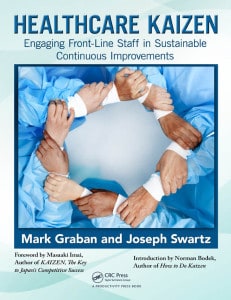Episode #133 is hosted by Ron Pereira, from Gemba Academy, as he leads me through additional Q&A as a follow up to our recent webinar on my upcoming book Healthcare Kaizen and some of the concepts from the book on the theme of “Putting the Continuous Back in Continuous Improvement.”
You can view the recording via this link.
Two of the main themes were that “kaizen” is not always about weeklong events and that suggestion boxes are not the same as the kaizen approach. Kaizen ideally involves everyone in continuous improvement, facilitated in ways that are better than the slow, batchy, non-collaborative suggestion box approach that many have tried and struggled with before.
For a link to this episode, refer people to www.leanblog.org/133.
For earlier episodes, visit the main Podcast page, which includes information on how to subscribe via RSS or via Apple Podcasts.
If you have feedback on the podcast, or any questions for me or my guests, you can email me at leanpodcast@gmail.com or you can call and leave a voicemail by calling the “Lean Line” at (817) 372-5682 or contact me via Skype id “mgraban”. Please give your location and your first name. Any comments (email or voicemail) might be used in follow ups to the podcast.
Disclosure note: The link to Gemba Academy is an affiliate link.
What do you think? Please scroll down (or click) to post a comment. Or please share the post with your thoughts on LinkedIn – and follow me or connect with me there.
Did you like this post? Make sure you don't miss a post or podcast — Subscribe to get notified about posts via email daily or weekly.
Check out my latest book, The Mistakes That Make Us: Cultivating a Culture of Learning and Innovation:











I viewed the webinar today. Good stuff. One question that occurred to me, and I’d hope many people would give their thoughts on this, is whether an organization, especially very early in its lean journey should turn its people loose with the quick Find/Discuss/Implement/Document/Share kind of point kaizen activities Mark shared, or first be sure to instill the discipline of A3/PDCA; i.e. develop the good habits of the problem-solving model before getting down to the quick-hitting Find/Discuss/Implement/Document/Share thinking… I’d love to hear peoples’ thoughts on this…
It doesn’t require much training at all to get staff started with Quick and Easy Kaizen. Encourage people to just start with simple “just do its.” We know there are enough of those opportunities laying around. These simple fixes don’t require the A3 or PDSA discipline. I think we often overcomplicate problem solving. It might seem like heresy, but not everything requires “5 whys.”
Masaaki Imai, in his 1986 book “KAIZEN” encouraged supervisors to basically just turn people loose (as you put it). Then, over time, you can start coaching and leading people through more advanced problem solving skills. Imai said the first stage of implementing Kaizen is all about encouraging improvement and building enthusiasm for it and I think that’s still good advice.
That said – the early stages of kaizen still involve staff members talking to their supervisor about their ideas. It’s not a total free for all with people just randomly implementing changes without involving others. So I don’t think there’s much to fear in early stages of kaizen at all.
A question from another webinar attendee:
From my experience, Daily Kaizen can be a great way to engage people in what eventually becomes a broader, more formal Lean management program. I don’t think you’d ever want to “only” do Daily Kaizen. One organization that is cited in our book, Cancer Treatment Centers of America, started with Daily Kaizen and then started doing longer formal events to address more complex opportunities for improvement.
Some organizations, including ThedaCare, have started with Daily Kaizen after a few years of a Lean program that included weeklong Rapid Improvement Events – they layered Daily Kaizen on top of that. I know some of these organizations with they had started earlier with Daily Kaizen. Others started with Daily Kaizen and Events pretty much working in parallel (Virginia Mason Medical Center being one of those).
Mark,
I just finished reading the first chapter of your book. I am really looking forward to it’s release in April. I am working hard at moving East Tennessee Children’s Hospital from a project based lean program to a daily kaizen lean culture. I’m sure this will be a huge help and a great reference during our transition. Thanks for doing this!
Isaac
Thanks, Isaac. Joe and I are hoping to build some sort of online community around our book and daily kaizen… I hope you’ll be able to share some of your experiences and lessons learned.